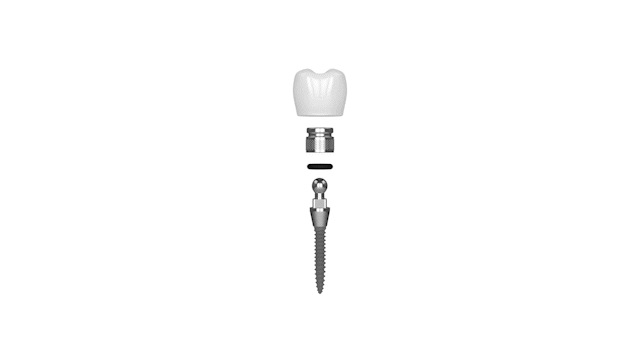A dental implant, by its very nature, cannot be considered non-invasive—just like a plant cannot simply be placed on top of soil and expected to grow. Implants must be anchored into the jawbone, integrating with the bone to provide stability and function. Without this essential step, they couldn’t support a restoration, like a plant without rooted contact with soil cannot absorb nutrients or remain upright. The reason implants work so well is because they become part of you. Once secure in the jaw, they provide the strength you need just like natural teeth. But let’s be honest, the idea of anything involving bone can sound intimidating. Even if the end result is life-changing, the thought of an invasive procedure is enough to make some people hesitate.
What if there were a way to get all the benefits of dental implants without the part that makes people nervous? Not a non-invasive solution, but a minimally invasive one. Mini dental implants make that possible, combining strength and stability with a gentler, faster, and more comfortable approach to tooth replacement.
The Truth About Non-Invasive Alternatives to a Dental Implant
Here’s the reality: dental implants require surgery, and that’s actually what makes them so effective.
Think of a dental implant like a tree. A tree isn’t just a trunk and leaves—it has roots that anchor it deep into the ground. The same goes for a natural tooth. The root stabilizes the tooth, stimulates the jawbone, and keeps a crown, bridge, or denture in place. When you lose a tooth, you don’t just lose what’s visible; you lose that crucial root system. Implants go beneath the surface—just like real roots. At the core of every implant’s success is osseointegration—the process where the implant fuses with the surrounding bone. This process allows an implant to function like a natural tooth.
Beyond stability, implants also play a critical role in preserving oral health. When a tooth is lost, the jawbone in that area no longer receives the stimulation it needs, leading to gradual bone deterioration. Traditional dentures and bridges do not address this issue. Dentures rest on top of the gums and can shift uncomfortably, while bridges require modifying healthy adjacent teeth for support. Neither option prevents bone loss over time.
With implants, you’re replacing a missing tooth and preserving your jawbone, facial structure, and ability to eat, speak, and smile confidently. So yes, the procedure is invasive—but it’s also the closest thing to getting your natural tooth back. And when it comes to long-term dental health, that’s a trade-off worth making.
Is a Mini Dental Implant Minimally Invasive or Non-Invasive?
Traditional dental implants require a more invasive approach to tooth replacement, and it starts with their size. These implants are approximately 5 millimeters in diameter, meaning they need a strong, healthy jawbone for support. To place them securely, a dentist must perform flap surgery—a procedure that involves making an incision in the gums, lifting the tissue to expose the bone, and then drilling a space for the implant. Once the implant is positioned, the gum tissue is sutured back into place, and the healing process begins. While effective, this method requires significant healing time and may even involve bone grafting if the jawbone isn’t dense enough to support the implant.
Mini dental implants, on the other hand, take a far less invasive approach. At less than 3 millimeters in diameter, they don’t require large incisions or extensive surgical work. Instead of cutting into the gums, Dr. Hall creates a small pilot hole in the jawbone. The implant is gently inserted into this opening, and that’s it—no stitches, no lengthy recovery, and minimal discomfort. The result? A quicker, smoother process that allows many patients to resume normal activities within a day or two. While mini dental implants are not “non-invasive”—since they do involve placing a titanium post in the bone—they are undoubtedly a minimally invasive alternative that simplifies the process without compromising results.
Mini Dental Implants: Less Surgery and Less Cost
Because mini dental implants require a less invasive procedure, they also come with a lower price tag. Traditional implants involve multiple surgical steps, a longer healing period, and, in some cases, additional procedures like bone grafting. All of these factors add to the overall cost. Mini implants streamline the process by eliminating the need for incisions, sutures, and extensive recovery time, making them a more affordable option for many patients. In fact, mini dental implants often cost about half as much as traditional implants.
Plus, with their quicker recovery time and fewer complications, mini implants provide not only a more budget-friendly solution but also a more convenient one—allowing patients to enjoy the benefits of a secure, functional smile with less hassle.
A More Comfortable, Affordable Way To Restore Your Teeth
Missing teeth shouldn’t mean missing out on life. If you’ve been putting off dental implants because of concerns about surgery or cost, mini dental implants offer a simpler, more affordable solution. With a minimally invasive procedure, faster recovery, and lasting stability, they provide all the benefits of traditional implants—without the hurdles. Contact us today to schedule your free consultation.
Mini dental implants are changing smiles every day—follow us on Facebook and Instagram to learn more about their benefits and how they compare to traditional implants!

